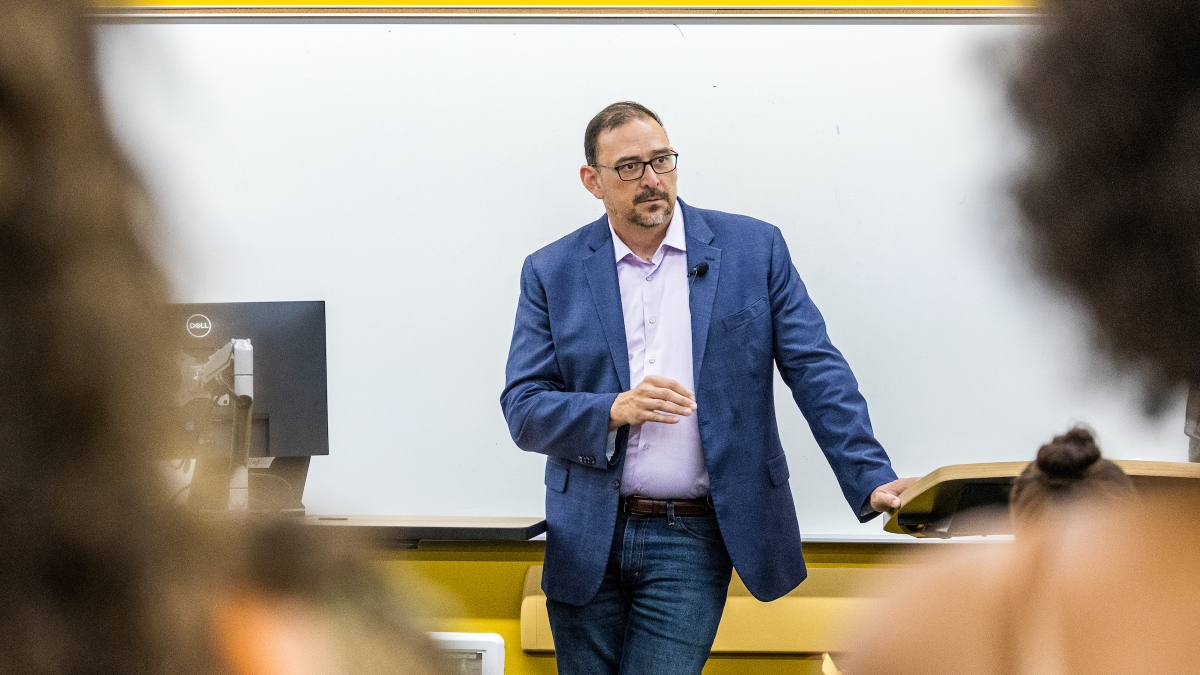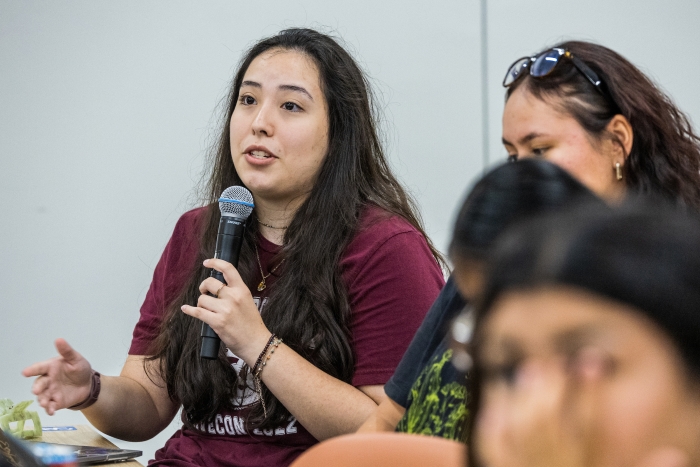Arizona secretary of state encourages students to vote

Arizona Secretary of State Adrian Fontes speaks to students in ASU's Introduction to Justice Studies about voting access and rights on Thursday, Aug. 29, on ASU's Tempe campus. Photo by Charlie Leight/ASU News
Arizona Secretary of State Adrian Fontes looked right and left, taking in the more than 100 students who gathered to hear him speak in room 103 of Wilson Hall.
He then told the students in the Intro to Justice Studies 105 class why they should register and vote in the 2024 election.
“You would set the agenda as it pertains to the environment,” Fontes said. “You would set the agenda as it pertains to reproductive rights. You would set the agenda as it pertained to ethics rules in our courts. You would be setting the agenda.
“I know if you’re sitting in this class, the likelihood is that you do vote. But if you don’t, shame on you, because you’re letting somebody else use that influence.”
Fontes was invited to speak as part of the Seeking Justice in Arizona fall lecture series, hosted by Arizona State University’s School of Social Transformation.
Fontes’ passion for the democratic process was evident just minutes into his talk.
“I’m not going to apologize for fighting as hard as I can to make sure that every single person who’s eligible to vote actually has access to the ballot,” he said.
Fontes told the students that elections are not about individual votes, but the collective decision made by voters. The contribution, he called it, that an individual can make to the conversation.
“This is not a you thing,” he said. “It’s an us thing. And here’s where the problem comes in that we’re experiencing today. Some people think that only their vote ought to matter. Some people think that only their candidate ought to win. That’s not how this works.
“Talk to me about barn raisings. Talk to me about the county fair. Talk to me about a baseball team where everybody gets together and expends their resources in a uniform way, united for a common cause. We don't exist on an island. Not a single one of us does. And if that's the attitude that we're going to have, then we might as well be living in an anarchy.”
Fontes said the polarization in today’s political climate is, in part, caused by foreign adversaries like China, Iran and Russia that use disinformation to sow discontent in the United States.
“There is one way that they know they can beat us, and that is by getting us to beat ourselves,” he said. “That’s what they want. That’s their goal.”
Fontes said there is an industry of “grifters and liars” who are getting rich by spreading conspiracy theories about elections — peddling, for example, the idea that “some random poll worker is part of a vast conspiracy to steal some political office.”
The truth, Fontes said, is that Arizona officials have implemented several procedures over the past 10 years to ensure the reliability and accuracy of elections. They created a check-in system that significantly reduced the number of provisional ballots. They allowed people to vote outside their precinct. Voters can now receive an email or text message that tells them their ballot is being prepared, another message to say their ballot has been mailed, and then additional messages that say their ballot was received and their signature was verified.
“We’re pushing information to voters to make sure that we can continue to build trust in our systems,” he said.
Fontes said his office also is trying to attract new voters. One way is the Online Voter Registration Unique URL program, which encourages organizations conducting large-scale voter registration drives to do so electronically and securely rather than relying exclusively on paper forms.
“I don’t care if it’s a political group on the right or the left, if it’s a religious group or your yoga class. You can be empowered to register voters,” Fontes said. “You can encourage them to continue on through the process and actually cast their ballots. You get empowered to do the work of your community, and you’re empowering people to make these things happen on their own.”
Fontes also encouraged students to vote early, saying it saves resources on election day, helps the election system overall and “really does help you avoid sort of the anxiety” of having to vote at the last minute.
More Law, journalism and politics

Veteran journalists Jorge Ramos and Marty Baron talk democracy and free press
Arizona State University hosted "Truth Across Borders," a bilingual panel featuring two of America’s most iconic journalists, last week in the Evelyn Smith Music Theatre on Arizona State University's…
Can elections results be counted quickly yet reliably?
Election results that are released as quickly as the public demands but are reliable enough to earn wide acceptance may not always be possible.At least that's what a bipartisan panel of elections…
Spring break trip to Hawaiʻi provides insight into Indigenous law
A group of Arizona State University law students spent a week in Hawaiʻi for spring break. And while they did take in some of the sites, sounds and tastes of the tropical destination, the trip…


